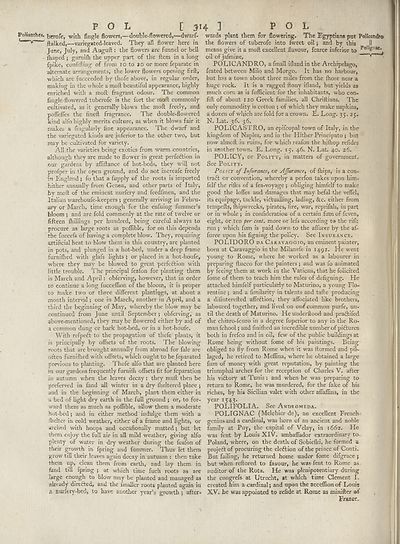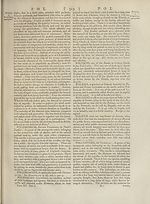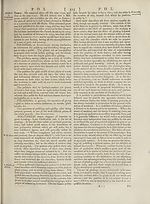Encyclopaedia Britannica > Volume 15, PLA-RAM
(354) Page 314
Download files
Complete book:
Individual page:
Thumbnail gallery: Grid view | List view

POL [ 3H j POL
Poliantheg. berofe> w;th fmgle flowers,—double-flowered,—dwarf-
ftalked,—variegated-leaved. They all flower here in
June, July, and Auguft: the flowers arc funnel or bell
fhaped ; garnifh the upper part of the ftem in a long
fpike, confifting of from 10 to 20 or more feparate in
alternate arrangements, the lower flowers opening firft,
which are fucceeded by thofe above, in regular order,
making in the whole a moil beautiful appearance, highly
enriched with a moll fragrant odour. The common
Angle-flowered tuberofe is the fort the rood commonly
cultivated, as it generally blows the moll freely, and
poflefies the fined fragrance. The double-flowered
kind alfo highly merits culture, as when it blows fair it
makes a Angularly fine appearance. The dwarf and
the variegated kinds are inferior to the other two, but
may be cultivated for variety.
All the varieties being exotics from warm countries,
although they are made to flower in great perfection in
our gardens by aflidance of hot-beds, they will not
profper in the open ground, and do not increafe freely
in England; fo that a fupply of the roots is imported
hither annually from Genoa, and other parts of Italy,
by mod of the eminent nurfery and feedfmen, and the
Italian warehoufe-keepers ; generally arriving in Febru¬
ary or March, time enough for the enfuing dimmer’s
bloom ; and are fold commonly at the rate of twelve or
fifteen {hillings per hundred, being careful always to
procure as large roots as pofiible, for oh this depends
the fuccefs of having a complete blow. They, requiring
artificial heat to blow them in this country, are planted
in pots, and plunged in a hot-bed, under a deep frame
furniflied with glafs lights ; or placed in a hot-houfe,
where they may be blowed to great perfection with
little trouble. The principal feafon for planting them
is March and April: obferving, however, that in order
10 continue a long fucceffion of the bloom, it is proper
to make two or three different plantiqgs, at about a
month interval; one in March, another in April, and a
third the beginning of May, whereby the blow may be
continued from June until September; obferving, as
above-mentioned, they may be flowered either by aid of
a common dung or bark hot-bed, or in a hot-houfe.
With refpeCl to the propagation of thefe plants, it
is principally by offsets of the roots. The blowing
roots that are brought annually from abroad for fale are
often furniftied with offsets, which ought to be feparated
previous to planting. Thofe alfo that are planted here
in our gardens frequently furnifli offsets fit for feparation
in autumn when the leaves decay: they muff then be
preferved in fand all winter in a dry fheltered place ;
and in the beginning of March, plant them either in
a bed of light dry earth in the full ground ; or, to for¬
ward them as much as poffible, allow them a moderate
hot-bed; and in either method indulge them with a
/belter in cold weather, either of a frame and lights, or
arched with hoops and occafionally matted; but let
them enjoy the full air in all mikl weather, giving alfo
plenty of water in dry weather during the feafon of
their growth in fpring and fummer. Thus let them
grow till their leaves again decay in autumn : then take
them up, clean them from earth, and lay them in
fand till fpring ; at which time fuch roots as are
large enough to blow may be planted and managed as
already directed, and the fmaller roots planted again in
a mirfcry-bed, to have another year’s growth ; after¬
wards plant them for flowering. The Egyptians put Policandr©
the flowers of tuberofe into fweet oil; and by this .11
means give it a moft excellent flavour, fcarce inferior to Po^gnac',<
oil of jafmine, y u -
POLICANDRO, a fmall ifland in the Archipelago,
feated between Milo and Morgo. It has no harbour,
but has a town about three miles from the fhore near a
huge rock. It is a ragged llony ifland, but yields as
much corn as is fufficient for the inhabitants, who con-
fift of about 120 Greek families, all Chriitians. The
only commodity is cotton ; of which they make napkins,
a dozen of which are fold for a crown. E. Long. 35. 25.
N. Eat. 36. 36.
POLICASTRO, an epifcopal town of Italy, in the
kingdom of Naples, and in the Hither Principato ; but
now almoft in ruins, for which reafon the bifliop refides
in another town. E. Long. 15. 46. N. Lat. 40. 26.
POLICY, or Polity, in matters of government.
See Polity.
Poucr of Infurance, or si fur a nee, of fhips, is a con¬
tract or convention, whereby a perfon takes upon him-
felf the rifks of a fea-voyage ; obliging himfelf to make
good the Ioffes and damages that may befal the veffel,
its equipage, tackle, victualling, lading, &c. either from
tempefts, fhipwrecks, pirates, fire, war, reprifals, in part
or in whole ; in confideration of a certain fum of feven,
eight, or ten per cent, more or lefs according to the rifle:
run; which fum is paid down to the affurer by the af-
fui'ee upon his figning the policy. See Insurance.
POLIDORO da Caravaggio, an eminent painter,
born at Caravaggio in the Milanefe in 1492. He went
young to Rome, where he worked as a labourer in
preparing ftucco for the painters; and was fo animated
by feeing them at work in the Vatican, that he folicited
fome of them to teach him the rules of defigning. He
attached himfelf particularly to Maturino, a young Flo¬
rentine ; and a fimilarity in talents and tafte producing
a diiinterefted affeftion, they affociated like brothers,
laboured together, and lived on on^ common purfe, un¬
til the death of Maturino. He underilood and praeffifed
the chiaro-fcuro in a degree fuperior to any in the Ro¬
man fchool; and finiflied an incredible number of pictures
both in frefco and in oil, few of the public buildings at
Rome being without fome of his paintings. Being
obliged to fly from Rome when it was ftormed and pil¬
laged, he retired to Meffina, where he obtained a large
fum of money with great reputation, by painting the
triumphal arches for the reception of Charles V. after
his victory at Tunis: and when he wras prepai'ing to
return to Rome, he was murdered, for the fake of his
riches, by his Sicilian valet with other affaflins, in the
year 1543.
POLIFOLIA. See Andromeda.
POLIGNAC (Melchier de), an excellent French
genius and a cardinal, was born of an ancient and noble
family at Puy, the capital of Velay, in 1662. Fie
was fent by Louis XIV. ambaffador extraordinary to.
Poland, where, on the death of Sobielki, he formed a
projeCt of procuring the eleftion of the prince of Conti.
But failing, he returned home under fome difgrace ;
but when rellored to favour, he was fent to Rome as
auditor of the Rota. He was plenipotentiary during
the congrefs at Utrecht, at which time Clement 1.
created him a cardinal; and upon the acceffionof Louis
.XV. he was appointed to refide at Rome as minifter of
France,
Poliantheg. berofe> w;th fmgle flowers,—double-flowered,—dwarf-
ftalked,—variegated-leaved. They all flower here in
June, July, and Auguft: the flowers arc funnel or bell
fhaped ; garnifh the upper part of the ftem in a long
fpike, confifting of from 10 to 20 or more feparate in
alternate arrangements, the lower flowers opening firft,
which are fucceeded by thofe above, in regular order,
making in the whole a moil beautiful appearance, highly
enriched with a moll fragrant odour. The common
Angle-flowered tuberofe is the fort the rood commonly
cultivated, as it generally blows the moll freely, and
poflefies the fined fragrance. The double-flowered
kind alfo highly merits culture, as when it blows fair it
makes a Angularly fine appearance. The dwarf and
the variegated kinds are inferior to the other two, but
may be cultivated for variety.
All the varieties being exotics from warm countries,
although they are made to flower in great perfection in
our gardens by aflidance of hot-beds, they will not
profper in the open ground, and do not increafe freely
in England; fo that a fupply of the roots is imported
hither annually from Genoa, and other parts of Italy,
by mod of the eminent nurfery and feedfmen, and the
Italian warehoufe-keepers ; generally arriving in Febru¬
ary or March, time enough for the enfuing dimmer’s
bloom ; and are fold commonly at the rate of twelve or
fifteen {hillings per hundred, being careful always to
procure as large roots as pofiible, for oh this depends
the fuccefs of having a complete blow. They, requiring
artificial heat to blow them in this country, are planted
in pots, and plunged in a hot-bed, under a deep frame
furniflied with glafs lights ; or placed in a hot-houfe,
where they may be blowed to great perfection with
little trouble. The principal feafon for planting them
is March and April: obferving, however, that in order
10 continue a long fucceffion of the bloom, it is proper
to make two or three different plantiqgs, at about a
month interval; one in March, another in April, and a
third the beginning of May, whereby the blow may be
continued from June until September; obferving, as
above-mentioned, they may be flowered either by aid of
a common dung or bark hot-bed, or in a hot-houfe.
With refpeCl to the propagation of thefe plants, it
is principally by offsets of the roots. The blowing
roots that are brought annually from abroad for fale are
often furniftied with offsets, which ought to be feparated
previous to planting. Thofe alfo that are planted here
in our gardens frequently furnifli offsets fit for feparation
in autumn when the leaves decay: they muff then be
preferved in fand all winter in a dry fheltered place ;
and in the beginning of March, plant them either in
a bed of light dry earth in the full ground ; or, to for¬
ward them as much as poffible, allow them a moderate
hot-bed; and in either method indulge them with a
/belter in cold weather, either of a frame and lights, or
arched with hoops and occafionally matted; but let
them enjoy the full air in all mikl weather, giving alfo
plenty of water in dry weather during the feafon of
their growth in fpring and fummer. Thus let them
grow till their leaves again decay in autumn : then take
them up, clean them from earth, and lay them in
fand till fpring ; at which time fuch roots as are
large enough to blow may be planted and managed as
already directed, and the fmaller roots planted again in
a mirfcry-bed, to have another year’s growth ; after¬
wards plant them for flowering. The Egyptians put Policandr©
the flowers of tuberofe into fweet oil; and by this .11
means give it a moft excellent flavour, fcarce inferior to Po^gnac',<
oil of jafmine, y u -
POLICANDRO, a fmall ifland in the Archipelago,
feated between Milo and Morgo. It has no harbour,
but has a town about three miles from the fhore near a
huge rock. It is a ragged llony ifland, but yields as
much corn as is fufficient for the inhabitants, who con-
fift of about 120 Greek families, all Chriitians. The
only commodity is cotton ; of which they make napkins,
a dozen of which are fold for a crown. E. Long. 35. 25.
N. Eat. 36. 36.
POLICASTRO, an epifcopal town of Italy, in the
kingdom of Naples, and in the Hither Principato ; but
now almoft in ruins, for which reafon the bifliop refides
in another town. E. Long. 15. 46. N. Lat. 40. 26.
POLICY, or Polity, in matters of government.
See Polity.
Poucr of Infurance, or si fur a nee, of fhips, is a con¬
tract or convention, whereby a perfon takes upon him-
felf the rifks of a fea-voyage ; obliging himfelf to make
good the Ioffes and damages that may befal the veffel,
its equipage, tackle, victualling, lading, &c. either from
tempefts, fhipwrecks, pirates, fire, war, reprifals, in part
or in whole ; in confideration of a certain fum of feven,
eight, or ten per cent, more or lefs according to the rifle:
run; which fum is paid down to the affurer by the af-
fui'ee upon his figning the policy. See Insurance.
POLIDORO da Caravaggio, an eminent painter,
born at Caravaggio in the Milanefe in 1492. He went
young to Rome, where he worked as a labourer in
preparing ftucco for the painters; and was fo animated
by feeing them at work in the Vatican, that he folicited
fome of them to teach him the rules of defigning. He
attached himfelf particularly to Maturino, a young Flo¬
rentine ; and a fimilarity in talents and tafte producing
a diiinterefted affeftion, they affociated like brothers,
laboured together, and lived on on^ common purfe, un¬
til the death of Maturino. He underilood and praeffifed
the chiaro-fcuro in a degree fuperior to any in the Ro¬
man fchool; and finiflied an incredible number of pictures
both in frefco and in oil, few of the public buildings at
Rome being without fome of his paintings. Being
obliged to fly from Rome when it was ftormed and pil¬
laged, he retired to Meffina, where he obtained a large
fum of money with great reputation, by painting the
triumphal arches for the reception of Charles V. after
his victory at Tunis: and when he wras prepai'ing to
return to Rome, he was murdered, for the fake of his
riches, by his Sicilian valet with other affaflins, in the
year 1543.
POLIFOLIA. See Andromeda.
POLIGNAC (Melchier de), an excellent French
genius and a cardinal, was born of an ancient and noble
family at Puy, the capital of Velay, in 1662. Fie
was fent by Louis XIV. ambaffador extraordinary to.
Poland, where, on the death of Sobielki, he formed a
projeCt of procuring the eleftion of the prince of Conti.
But failing, he returned home under fome difgrace ;
but when rellored to favour, he was fent to Rome as
auditor of the Rota. He was plenipotentiary during
the congrefs at Utrecht, at which time Clement 1.
created him a cardinal; and upon the acceffionof Louis
.XV. he was appointed to refide at Rome as minifter of
France,
Set display mode to:
![]() Universal Viewer |
Universal Viewer | ![]() Mirador |
Large image | Transcription
Mirador |
Large image | Transcription
Images and transcriptions on this page, including medium image downloads, may be used under the Creative Commons Attribution 4.0 International Licence unless otherwise stated. ![]()
| Encyclopaedia Britannica > Encyclopaedia Britannica > Volume 15, PLA-RAM > (354) Page 314 |
|---|
| Permanent URL | https://digital.nls.uk/191905378 |
|---|
| Attribution and copyright: |
|
|---|
| Description | Ten editions of 'Encyclopaedia Britannica', issued from 1768-1903, in 231 volumes. Originally issued in 100 weekly parts (3 volumes) between 1768 and 1771 by publishers: Colin Macfarquhar and Andrew Bell (Edinburgh); editor: William Smellie: engraver: Andrew Bell. Expanded editions in the 19th century featured more volumes and contributions from leading experts in their fields. Managed and published in Edinburgh up to the 9th edition (25 volumes, from 1875-1889); the 10th edition (1902-1903) re-issued the 9th edition, with 11 supplementary volumes. |
|---|---|
| Additional NLS resources: |
|

